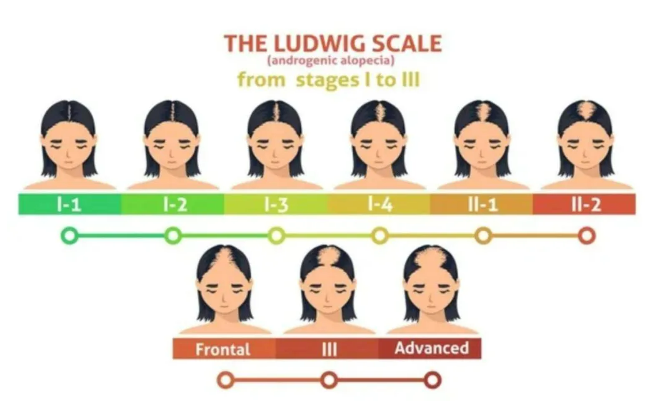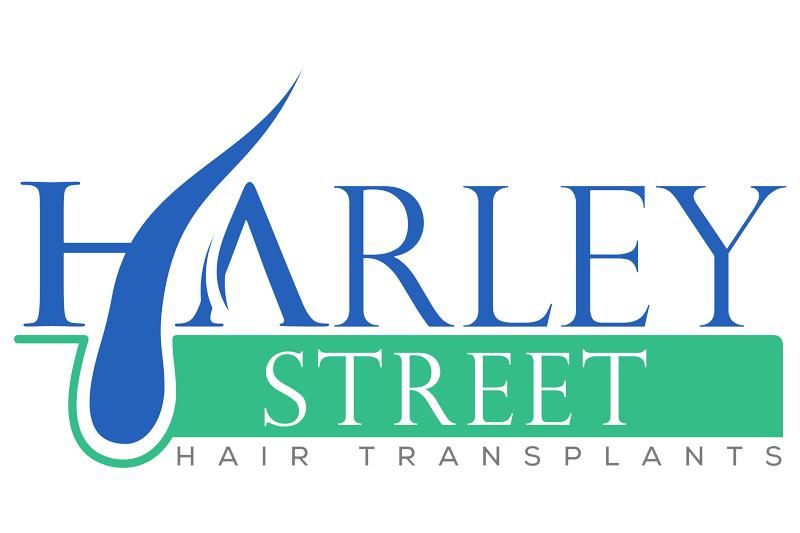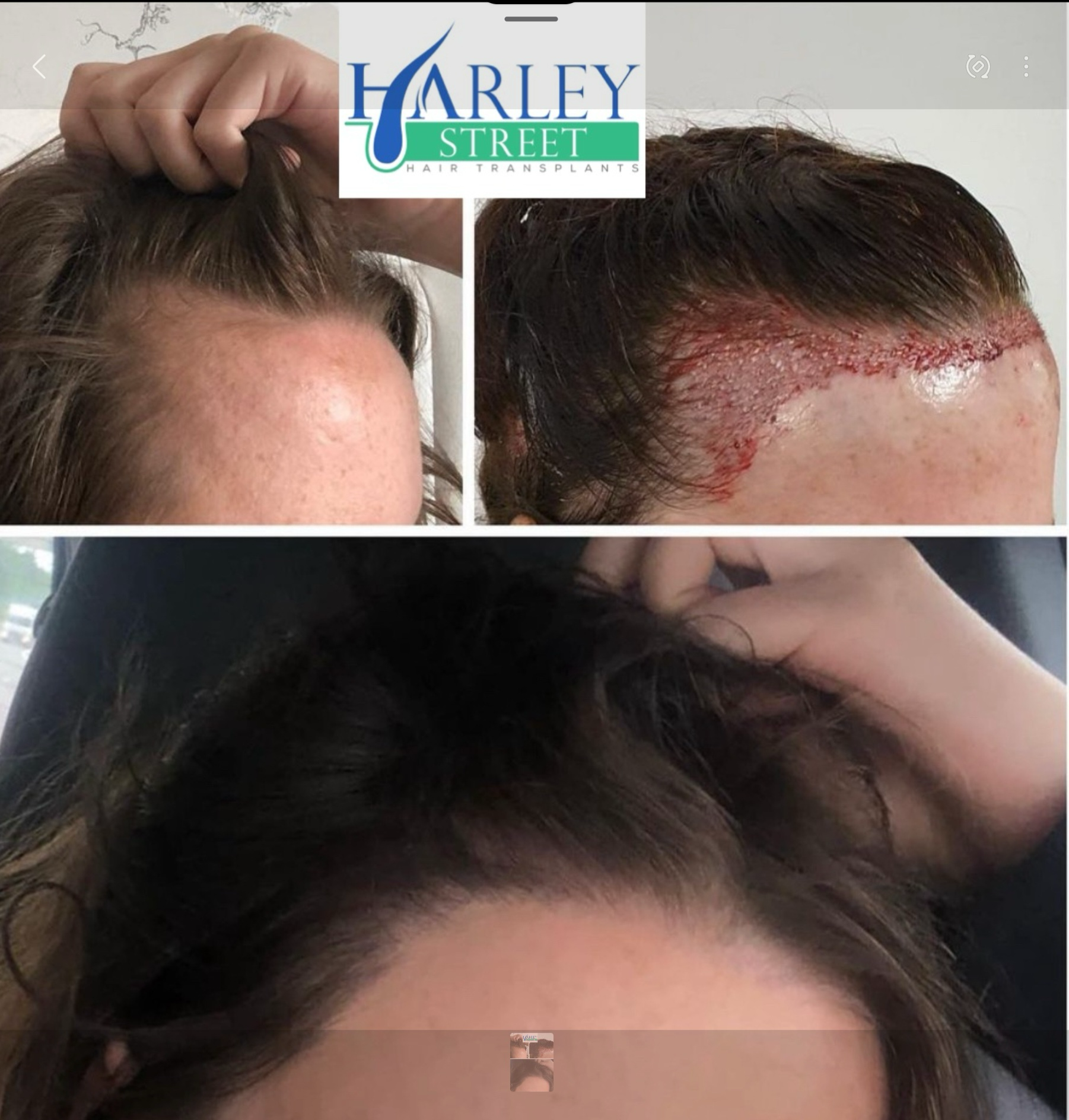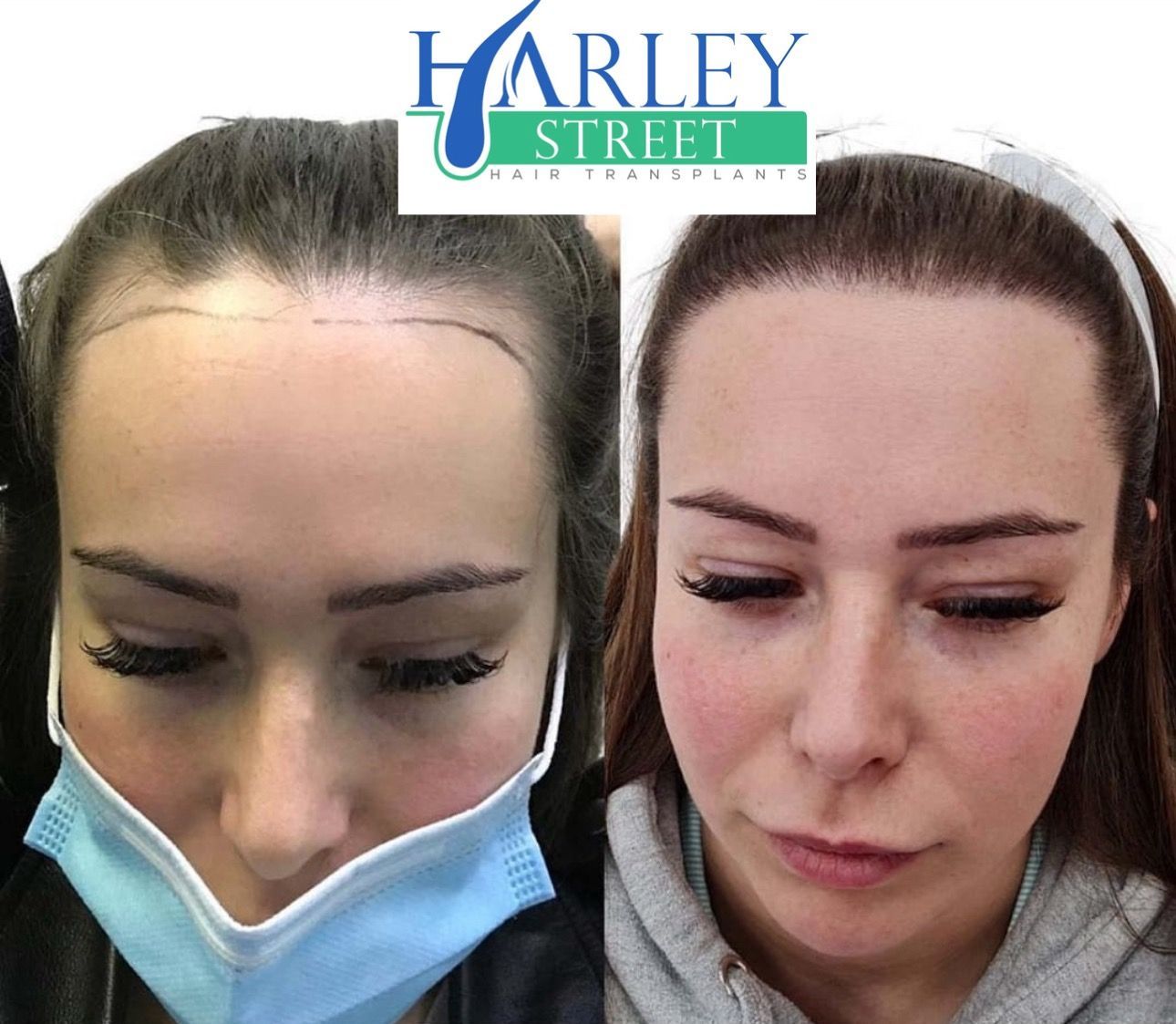Female Hair Transplants in Manchester
Female hair transplants are a popular and effective option for women who are experiencing hair loss or thinning. There are several factors that can contribute to female hair loss, including genetics, hormonal changes, medical conditions, and environmental factors, and hair transplant surgery can help restore hair density and improve the overall appearance of the hair.
During a female hair transplant procedure, hair follicles are harvested from the donor area of the scalp, typically the back or sides of the head, and transplanted to the areas of thinning or baldness. The procedure is typically performed using the FUE (Follicular Unit Extraction) method, which involves removing individual hair follicles from the donor area and transplanting them to the recipient area using tiny incisions.
At Harley Street Hair Transplants Manchester, our female hair transplant surgery can be customised to meet the individual needs and goals of each patient. The procedure can be used to restore hair density to the entire scalp or to target specific areas of thinning or baldness. Additionally, our female hair transplant surgery can be combined with other hair restoration treatments, such as non surgical hair loss treatments or topical hair growth medications, to maximise the results.
When looking for a clinic to carry out your procedure, it is important to work with a qualified and experienced hair transplant surgeon who has experience performing female hair transplants. Women have unique hair loss patterns and hair characteristics, and it's important to take these factors into account when planning the procedure. Additionally, our surgeons can provide advice on post-operative care and follow-up to ensure the best possible outcome.
If you're a woman who is experiencing hair loss or thinning, a hair transplant may be an effective solution to restore your hair density and confidence. Contact one of our highly experienced hair transplant surgeons to learn more about your options and to schedule a consultation to discuss your goals and expectations.
Our range of female
Hair Transplants
FUE
Follicular Unit Extraction (FUE) is a hair transplant technique that can benefit women who are experiencing hair loss or thinning. FUE involves extracting individual hair follicles from the donor area of the scalp and transplanting them to the area of hair loss or thinning. The procedure is minimally invasive and leaves no linear scar, making it an attractive option for women who prefer to wear their hair short. FUE can be used to restore hair density to the entire scalp or to target specific areas of thinning
FUT
Follicular Unit Transplantation (FUT) is a hair transplant technique that can benefit some women who are experiencing hair loss or thinning. FUT involves removing a strip of hair-bearing skin from the donor area of the scalp, and then dividing it into individual follicular units to be transplanted to the area of hair loss or thinning. While FUT can be an effective hair restoration option, it does leave a linear scar that may be visible if the hair is worn short. FUT is often used to restore hair density to larger areas of the scalp, and may be combined with other hair restoration techniques for optimal results.
Non Surgical Hair Loss Treatments
Non Surgical hair restoration treatments can benefit some women who are experiencing hair loss or thinning. This procedure involves injecting a concentrated solution of the patient's own platelets, which contain growth factors that promote hair growth, into the scalp. The treatment can be used to stimulate hair growth in areas of thinning or to improve the overall quality and texture of the hair. Non surgical hair loss treatment is a minimally invasive treatment that typically requires no downtime, and can be used as a standalone treatment or in combination with other hair restoration techniques for optimal results.
Eyebrow Hair Transplants
Eyebrow hair transplants are a procedure that can benefit women who have experienced hair loss or thinning in their eyebrows. The procedure involves transplanting hair follicles from the donor area of the scalp to the eyebrow area, resulting in fuller, more natural-looking eyebrows. Our eyebrow hair transplants are customised to meet the individual needs and goals of each patient, and the results are long-lasting. Working with one of our qualified and experienced hair transplant surgeons is important to ensure the best possible outcome and to minimise the risk of complications.
Afro Hair Transplants
Our hair loss surgeons have experience of working with patients with afro textured hair. Afro hair transplants for females involve transplanting hair follicles from the donor area (typically the back or sides of the scalp) to the recipient area (typically the front or top of the scalp) to improve hair density and restore hair loss. The procedure requires specialised skills and techniques to properly transplant the thick, curly hair characteristic of Afro-textured hair.
Male to Female Transitions
At Harley Street Hair Transplants Manchester, we also undertake hair transplants for individuals looking to undergo gender reassignment. Hair transplants can be a key component of the male-to-female transition process for transgender women. The procedure involves transplanting hair follicles from the donor area (typically the back or sides of the scalp) to the recipient area (typically the front or top of the scalp) to create a more feminine hairline and improve overall hair density. Hair transplants can be used alone or in combination with other treatments, such as hormone therapy, to achieve a more feminine appearance. Our hair transplant surgeons have experience of working with transgender patients and can create a customised treatment plan that addresses your unique goals and concerns.
Planning for a
Hair Transplant?
Planning for a hair transplant is an important step towards achieving your desired look. Before undergoing the procedure, it is important to consult with a qualified hair transplant surgeon to discuss your expectations, assess your suitability for the procedure, and create a personalised treatment plan. Our surgeons will evaluate your hair loss pattern, hair density, and donor area to determine the number of hair grafts needed and the best technique for your individual needs. Additionally, we will provide you with pre-operative instructions, such as avoiding blood-thinning medication and smoking, and post-operative care instructions to ensure a smooth recovery. It is important to follow these instructions carefully to optimise the success of the hair transplant procedure. With careful planning and the guidance of our skilled hair transplant surgeons, you can achieve natural-looking and long-lasting results from your hair transplant procedure.
Book Your
Free Consultation Today
Contact Us
Our range of
Hair Loss Treatments
Patient Care Is Our Leading Priority

FUE is a minimally invasive procedure that does not require a large incision or stitches, resulting in minimal scarring and a faster recovery time.

FUT can be an effective hair restoration option for patients with larger areas of baldness or those who require a higher number of grafts.

Non Surgical Hair Loss Treatment
Non-surgical hair restoration treatment makes use of the patient's own blood to promote hair growth.

Eyebrow hair transplants are a specialised hair restoration procedure that involves transplanting hair follicles from the scalp to the eyebrows.

Beard hair transplants are a specialized hair restoration procedure that involves transplanting hair follicles from the scalp or other areas of the body to the beard area.

Female hair transplants are a specialized hair restoration procedure that involves transplanting hair follicles to the areas of thinning or balding hair in women.
AFFORDABLE FEMALE HAIR TRANSPLANTS IN MANCHESTER
What are the advantages of a hair transplant for females?
Women may choose to have a hair transplant for a variety of reasons. Hair loss or thinning can be a source of emotional distress and can impact a woman's self-confidence and self-esteem. Hair transplant surgery can help restore hair density and improve the overall appearance of the hair, which can have a positive impact on a woman's quality of life.
Hair loss in women can be caused by a variety of factors, including genetics, hormonal changes, medical conditions, and environmental factors. Hair transplant surgery can help address these underlying causes by transplanting healthy hair follicles from the donor area of the scalp to the areas of thinning or baldness.
Additionally, hair transplant surgery can be a permanent solution to hair loss, unlike other hair restoration treatments that may require ongoing maintenance or regular treatments. Women who are experiencing hair loss may find that a hair transplant provides a long-term solution that allows them to feel more confident and comfortable in their appearance.
Other advantages of undergoing a female hair transplant include:
- Improved hair density: Hair transplant surgery can restore hair density in areas of the scalp that have experienced hair loss or thinning, resulting in a fuller, more natural-looking head of hair.
- Long-term solution: Hair transplant surgery is a permanent solution to hair loss, unlike other hair restoration treatments that may require ongoing maintenance or regular treatments.
- Customisable procedure: Female hair transplant surgery can be customized to meet the individual needs and goals of each patient. The procedure can be used to restore hair density to the entire scalp or to target specific areas of thinning or baldness.
- Safe and effective: Hair transplant surgery is a safe and effective procedure that has been performed for many years with a high success rate.
- Minimal downtime: The recovery time for hair transplant surgery is typically minimal, with most patients able to return to normal activities within a few days to a week after the procedure.
- Improved self-confidence: Hair loss or thinning can be a source of emotional distress and can impact a woman's self-confidence and self-esteem. Hair transplant surgery can help restore a woman's confidence and improve her quality of life.
It's important to note that hair transplant surgery is not appropriate for everyone. Women who are considering a hair transplant should work with a qualified and experienced hair transplant surgeon who can assess their individual needs and goals and recommend the most appropriate treatment options.
What is female pattern baldness?
Female pattern baldness, also known as androgenetic alopecia, is a common form of hair loss in women. It is characterized by a gradual thinning of the hair, particularly in the crown and top of the scalp, which can eventually lead to baldness. Female pattern baldness is caused by genetic and hormonal factors, specifically an inherited sensitivity to androgens, which are male hormones that are also present in women in smaller amounts. Androgens can cause the hair follicles to shrink and produce thinner and shorter hair, leading to hair loss over time. While female pattern baldness can be distressing, there are a variety of hair restoration options available that can help improve hair density and overall appearance.

What causes hair loss in females?
Hair loss in females can be caused by a variety of factors, both genetic and non-genetic. One of the most common causes of hair loss in women is androgenetic alopecia, which is a genetic condition that causes the hair follicles to shrink over time, leading to thinning hair and eventually hair loss. Hormonal changes, such as those that occur during menopause, can also contribute to hair loss in women. Other factors that can cause hair loss in women include stress, poor nutrition, certain medications, autoimmune disorders, and physical or emotional trauma. It is important to consult with a medical professional to determine the underlying cause of hair loss and develop a treatment plan that addresses the root cause to achieve optimal results.


